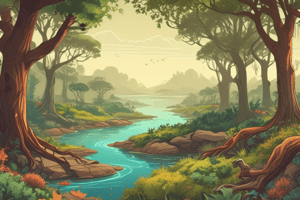Podcast
Questions and Answers
What do researchers learn about by observing how ecosystems respond to natural disturbances?
What do researchers learn about by observing how ecosystems respond to natural disturbances?
- Adaptive processes (correct)
- Genetic mutations
- Geological formations
- Population dynamics
What is a key aspect of ecologists' investigations according to the text?
What is a key aspect of ecologists' investigations according to the text?
- Qualitative assessments
- Subjective opinions
- Quantitative measurements (correct)
- Anecdotal evidence
How do researchers contribute to our understanding of ecosystem processes, according to the text?
How do researchers contribute to our understanding of ecosystem processes, according to the text?
- By making wild guesses
- By conducting empirical observations (correct)
- By relying on superstitions
- By avoiding data collection
What is a primary aim of ecologists' work, as mentioned in the text?
What is a primary aim of ecologists' work, as mentioned in the text?
Which method do ecologists heavily rely on to arrive at explanatory theories regarding ecosystem functioning?
Which method do ecologists heavily rely on to arrive at explanatory theories regarding ecosystem functioning?
What does ecology in biology study?
What does ecology in biology study?
What do ecologists examine in relation to ecosystems?
What do ecologists examine in relation to ecosystems?
Which factor affects population sizes and community structures in ecology?
Which factor affects population sizes and community structures in ecology?
What elements are considered when studying habitats in ecology?
What elements are considered when studying habitats in ecology?
Which ecological concept assesses whether certain species thrive under specific climatic conditions?
Which ecological concept assesses whether certain species thrive under specific climatic conditions?
How do ecologists describe the relationship between plants and animals in a given area?
How do ecologists describe the relationship between plants and animals in a given area?
Flashcards are hidden until you start studying
Study Notes
Ecology in Biology
Ecology is the branch of biology that studies interactions among organisms and their environment. It examines relationships between living beings and their physical surroundings, including factors like climate, soil composition, and natural resources. Ecologists observe and document patterns, cycles, and trends related to ecosystems over space and time scales, aiming to understand how systems function as wholes and respond to change.
One aspect of studying ecology is understanding the interrelationships between various plants and animals in a given area. This can involve looking at food chains where energy flows through a system, as well as analyzing trophic dynamics that affect population sizes and community structures. Population growth rates, predator-prey ratios, competition, and mutualism all factor into ecological analysis.
Another element of ecological study focuses on habitats, such as forests, deserts, wetlands, grasslands, lakes, oceans, and coral reefs. The goal is to determine which types of organisms inhabit a particular region and what influences environmental conditions have on their presence or absence. Habitat suitability indices, for instance, assess whether certain species thrive best under certain climatic or geographical circumstances.
Finally, ecology also takes into consideration natural disturbances caused by events such as fires, floods, storms, windstorms, volcanic eruptions, landslides, earthquakes, tsunamis, tidal waves, and hurricanes. By observing how ecosystems respond to such changes, researchers learn about resilience, recovery times, and adaptive processes at play in the face of adversity. These insights contribute to our overall understanding of how nature works and how we might best manage ecosystems sustainably.
Throughout the course of their investigations, ecologists rely heavily on empirical observations, quantitative measurements, mathematical models, and computer simulations to arrive at explanatory theories regarding the functioning of ecosystems. Their work aims both to enhance our general knowledge about ecosystem processes and to guide stewardship actions aimed at preserving the health of Earth's landscapes, waterways, and atmospheres.
Studying That Suits You
Use AI to generate personalized quizzes and flashcards to suit your learning preferences.




